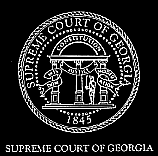 |

|
|
|
|
Compiled by GayToday
 In a 6-1 decision, the Georgia Supreme Court ruled Monday that the state's sodomy law, which affects both heterosexuals and homosexuals, violates the right to privacy guaranteed by the
Georgia Constitution. Powell v. State, No. S98A0755.
In a 6-1 decision, the Georgia Supreme Court ruled Monday that the state's sodomy law, which affects both heterosexuals and homosexuals, violates the right to privacy guaranteed by the
Georgia Constitution. Powell v. State, No. S98A0755.
The now-defunct Georgia law had served as the basis of two anti-gay U.S. Supreme Court cases. The first was the landmark Bowers v. Hardwick in 1986, when it found no constitutional right to privacy for same-gender conduct. Earlier this year, the U.S. Supreme Court refused to hear the case of attorney Robin Shahar, whose job offer from then-Attorney General Michael Bowers was rescinded after discovering she was planning a commitment ceremony with her partner. Bowers claimed her lesbian relationship violated the Georgia sodomy law, which he himself defended in Bowers v. Hardwick. In Monday's decision, Georgia's Chief Justice Robert Benham, writing for the majority, found that the sodomy statute, O.C.G.A. §16-6-2, "insofar as it criminalizes the performance of private, non-commercial acts of sexual intimacy between persons legally able to consent, 'manifestly infringes upon a constitutional provision . . . which guarantees to the citizens of Georgia the right of privacy." Justice George H. Carley dissented, arguing that "the Court has usurped the legislative authority of the General Assembly to establish the public policy of this state." Justice Leah J. Sears wrote a separate concurring opinion taking issue with the dissent's assertion and insisting that the majority "has fulfilled its constitutional responsibility within the American tripartite system of checks and balances." The issue arose in the appeal of Anthony San Juan Powell, who was convicted in Gwinnett Superior Court of violating the sodomy law for engaging in a sex act with his 17-year-old niece. Powell was charged with rape and aggravated sodomy, but insisted at trial that he had engaged in consensual intercourse and oral sodomy. The trial court instructed the jury on the law of rape and aggravated sodomy. In addition, the trial judge, of its own motion and not at the request of any of the parties, instructed the jury on the law of sodomy. The defense repeatedly objected to the instructions on the sodomy law, arguing that it violated Powell's constitutionally protected right of privacy. The defense also argued that the trial court erred in giving the instruction because Powell was not charged with sodomy and neither side requested instructions on the law.
 The Supreme Court held that the trial court had the authority to instruct the jury
on the law of sodomy of its own volition. The court
also found that the defendant's admission and the niece's testimony established
sufficient evidence to support a sodomy conviction.
The Supreme Court held that the trial court had the authority to instruct the jury
on the law of sodomy of its own volition. The court
also found that the defendant's admission and the niece's testimony established
sufficient evidence to support a sodomy conviction.
The Supreme Court then turned to the constitutional issue, pointing out that Georgia was a pioneer in the realm of the right of privacy. The Georgia Supreme Court was the first court of last resort to recognize a right to privacy, holding in a 1905 decision "that Georgia citizens have a 'liberty of privacy' guaranteed by the Georgia constitutional provision which declares that no person shall be deprived of liberty except by due process of law." That decision, Pavesich v. New England Life Ins., 122 Ga. 190 (1905), recognized a right of privacy 60 years before the U.S. Supreme Court recognized the right under the federal Constitution in Griswold v. Connecticut, 381 U.S. 479 (1965). "Today, we are faced with whether the constitutional right of privacy screens from governmental interference a non-commercial sexual act that occurs without force in a private home between persons legally capable of consenting to the act," Benham wrote, pointing out that Pavesich and the decisions that have followed it "do not set out the full scope of the right of privacy in connection with sexual behavior." "We cannot think of any other activity that reasonable persons would rank as more private and more deserving of protection from governmental interference than consensual, private, adult sexual activity," the majority opinion stated. "We conclude that such activity is at the heart of the Georgia Constitution's protection of the right of privacy." The Georgia Supreme Court then turned to the question of "whether the government's infringement upon that right is constitutionally sanctioned." In so doing, the court considered whether the government-imposed limitation serves a compelling state interest and is narrowly tailored to effectuate only that compelling interest. Citing numerous statutes prohibiting sexual assault, child molestation and public sex, the Supreme Court pointed out that the state "fulfills its role in preventing sexual assaults and shielding and protecting the public from sexual acts by the enactment of criminal statutes prohibiting such conduct" and through "the vigorous enforcement of those laws through the arrest and prosecution of offenders." "In light of the existence of these statutes," the court added, "the sodomy statute's raison d'ętre can only be to regulate the private sexual conduct of consenting adults, something which Georgia's right of privacy puts beyond the bounds of government regulation." Georgia's Supreme Court found that the statute exceeds the permissible bounds of the state's police power because "the only possible purpose for the statute is to regulate the private conduct of consenting adults, the public gains no benefit, and the individual is unduly oppressed by the invasion of the right to privacy." The Supreme Court rejected the state's argument that laws setting "social morality" are exempt from judicial review. "'Social morality legislation,' like any legislative enactment, is subject to the scrutiny of the judicial branch,'" Benham wrote. "In undertaking the judiciary's constitutional duty, it is not the prerogative of members of the judiciary to base decisions on their personal notions of morality," the court added. "Indeed, if we were called upon to pass upon the propriety of the conduct herein involved, we would not condone it." "Rather, the judiciary is charged with the task of examining a legislative enactment when it is alleged to impinge upon the freedoms and guarantees contained in the Georgia Bill of Rights and the U.S. Constitution, and scrutinizing the law, the interests it promotes, and the means by which it seeks to achieve those interests, to ensure that the law meets constitutional standards. While many believe that acts of sodomy, even those involving consenting adults, are morally reprehensible, this repugnance alone does not create a compelling justification for state regulation of the activity." Kerry Lobel, executive director of the National Gay and Lesbian Task Force said "Sodomy laws are the linchpin in attacks against the gay, lesbian, bisexual and transgendered community…They are used to criminalize our behavior and are the basis for discrimination in employment, housing, health care and against families. We applaud the Court for its vote today and also salute the tireless work of Georgia activists who have helped change the climate in the state."
|
 Kerry Lobel
Kerry Lobel 